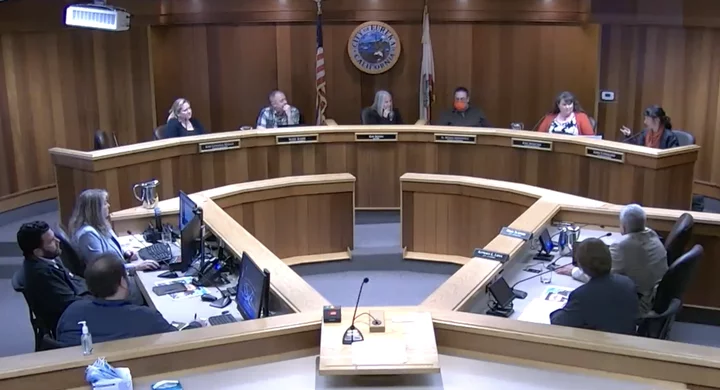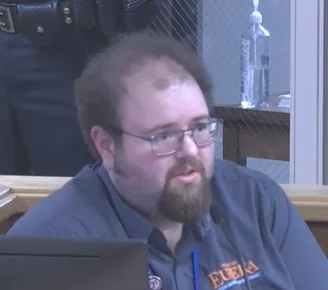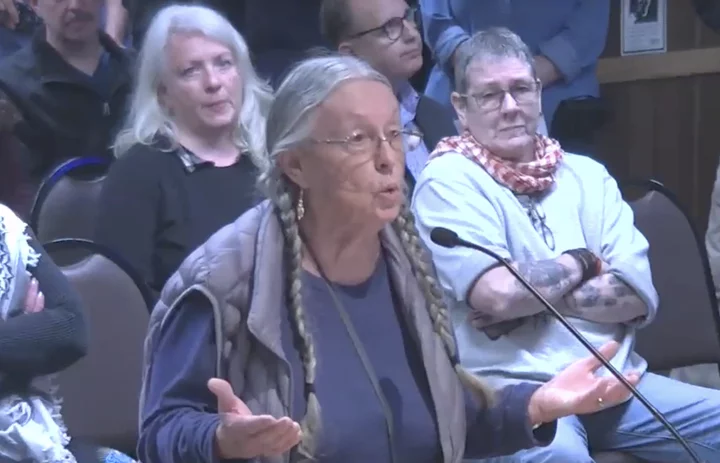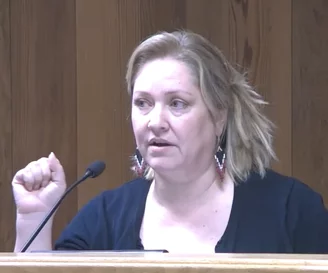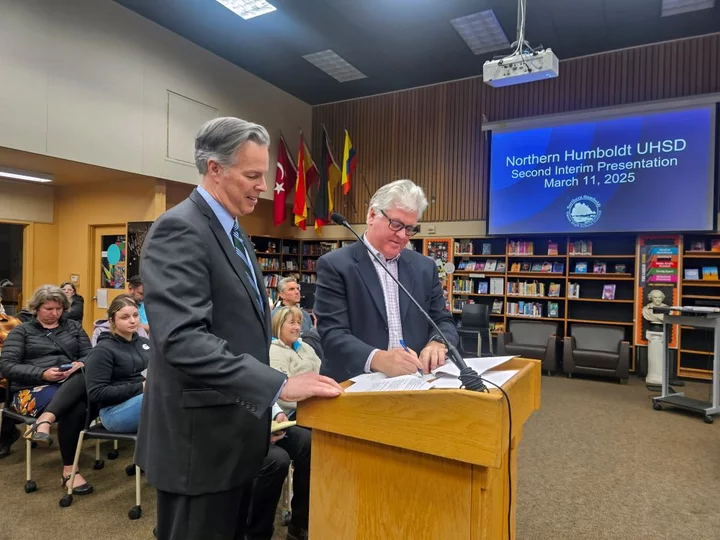OBITUARY: Vernon Lee ‘Bungee’ Broyles, 1952-2025
LoCO Staff / Thursday, March 20, 2025 @ 6:56 a.m. / Obits
It is with heavy
hearts that we announce the passing of Vernon Lee Broyles, a beloved
husband, father, Papa, and great-grandpa, who left this world on
February 16, 2025. Born on January 7, 1952, to Clyde and Hazel
Broyles, Vernon was the oldest of three boys and grew up in the
community of Eureka, where he graduated from Eureka High School in
1970.
Vernon’s life was a testament to love and dedication. He married the love of his life, Linda Hatten, just two months after a fateful blind date, on November 23, 1972. Together, they shared 52 wonderful years filled with laughter, adventure, and unwavering support for one another. As a devoted father, he raised two daughters, Tiffany and Angie, instilling in them the values of kindness, hard work, and the importance of family.
Vernon dedicated over 35 years of his life to the Pacific Lumber Company, where he was known for his strong work ethic and camaraderie with his colleagues. His commitment to his community extended beyond his job; he was an active member of the Scotia and Rio Dell Volunteer Fire Department and the Scotia Men’s Club, where he made lasting friendships and contributed to the well-being of those around him.
A man of many passions, Vernon found joy in the simple pleasures of life. He loved fishing, camping, and taking long “rides” with his best friend, Buddy Bennett. He looked forward to his weekly visits with Barry Scholl, where they would reminisce and share stories. The two were like brothers to him.
Vernon had a playful spirit, often delighting in the thrill of arrowhead hunting along local beaches and metal detecting for hidden treasures. He had a knack for finding value in the overlooked, believing that anything free was worth its weight in gold. His harmonica playing brought joy to family gatherings, and his annual trips to Disneyland with his family were a highlight of each summer.
A true animal lover, Vernon found peace in nature, whether it was watching birds, feeding deer, or spoiling his little dog, Summer. He had a gift for conversation, always ready to share a story or lend an ear to anyone who would listen.
Vernon is survived by his loving wife, Linda Hatten Broyles; his daughters, Tiffany Land (Ken) and Angie Crandall (Karl); his five grandsons, Kyler Griffith, Austin Crandall, Quest Crandall, Korbin Land, and Konnor Land; and his cherished great-grandson, Teale Griffith.
As we remember Vernon, we celebrate a life well-lived, filled with love, friendship, and countless memories. He will be deeply missed but forever cherished in the hearts of those who knew him.
We will be having a celebration of life on July 5, 2025 at the Scotia Fireman’s Ballpark.
###
The obituary above was submitted on behalf of Vernon Broyles’ loved ones. The Lost Coast Outpost runs obituaries of Humboldt County residents at no charge. See guidelines here. Email news@lostcoastoutpost.com.
BOOKED
Today: 8 felonies, 10 misdemeanors, 0 infractions
JUDGED
Humboldt County Superior Court Calendar: Today
CHP REPORTS
Fernbridge Dr / Sr211 (HM office): Traffic Hazard
2979 Mm36 E Tri R29.80 (RD office): Live or Dead Animal
ELSEWHERE
RHBB: Two Women Dead, Motel Closed After Carbon Monoxide Found at Scene of Repeated Overdose Calls
Governor’s Office: DINERO GRATIS PARA LA UNIVERSIDAD: Nuevo esfuerzo conecta a estudiantes de colegios comunitarios en California con becas disponibles de CalKIDS
KINS’s Talk Shop: Talkshop March 5th, 2026 – William Honsal
Governor’s Office: Governor Newsom announces over $2 million in funding for small businesses innovating in the Golden State
Eureka City Council Tables Decision on Controversial Ordinance That Would Increase Penalties Against Unhoused Residents
Isabella Vanderheiden / Wednesday, March 19, 2025 @ 5:18 p.m. / Homelessness , Local Government
Screenshot of Tuesday’s Eureka Council meeting.
###
After hearing three and a half hours of impassioned — and at times enraged — public testimony from concerned residents and homeless advocates at last night’s meeting, the Eureka City Council unanimously voted to postpone its decision on an ordinance that would increase penalties for people living in unauthorized encampments.
The draft ordinance — linked here — is a “streamlined” version of two existing policies that restrict unlawful camping, sitting, lying and loitering in public spaces. Staff believes the modified ordinance would serve as an “additional tool” to encourage unhoused community members to “engage with available services” by upgrading penalties from an infraction to a misdemeanor, which, upon conviction, could result in up to a year in jail or a fine up to $1,000.
The proposed ordinance would allow the city to redirect offenders to rehabilitative services instead of jail through its Law Enforcement Alternative Diversion (LEAD) program.
“I hope that [it’s] clear to our entire community that the City of Eureka is 100 percent committed to balancing accountability with compassionate support for individuals experiencing homelessness,” said City Manager Miles Slattery. “This recommendation comes from the endorsement of your professional staff with decades of experience in the field of progressive police practices, social service, programming and mental health. All of these professionals are intimately familiar with our unhoused community members and interact with them daily, seven days a week.”
Managing Mental Health Clinician Jacob Rosen, who leads Crisis Alternative Response Eureka (CARE), went over the finer points of the proposed ordinance and the LEAD program. He acknowledged homeless advocates’ concerns surrounding increased penalties for offenders but offered reassurance that it would “increase the efficacy of the accountability interactions with EPD.”
“The idea behind having the misdemeanor is it provides more motivation for the individual to then participate with LEAD. This isn’t something that is necessarily meant to be a one-off, except in extraordinary circumstances,” Rosen said, referring to a “one-off” interaction with EPD as opposed to someone who has been contacted or cited on numerous occasions. “The first step in this process is the referral … the second part is intake. We then have the ‘plan development phase’ … and then talk about engagement — getting the client engaged in the community with the services that they desire, connecting them to those services, and then graduation.”
Rosen emphasized the importance of “reducing barriers” for people who choose to participate in LEAD to increase the program’s chances of success. The city is hoping to expand drop-in hours at the city’s new community resource center, located in the Municipal Auditorium at 1111 E Street, to accommodate LEAD participants. “Or we can go out in the field and meet them there,” he said.
Once intake is complete, LEAD staff will work with the individual to determine what resources they need and help them set long- and short-term goals to get to their eventual graduation from the program.
“Completion of LEAD is based on participation towards the individualized goals, not regimented activities,” Rosen said. “This isn’t something where people are going to come and do community service, right? This is going to be something where they identify what they need and then work toward those specific goals. It’s going to look different for each individual.”
Rosen reiterated Slattery’s previous point, emphasizing that the purpose of the ordinance is to balance accountability with compassion and “increase the efficacy of accountability interventions.” He added that the LEAD program will use programs and systems that are already in place and will not require the city to bolster other services. The program could be ready for implementation as soon as May 1.
Special Program Manager Jeff Davis, who heads Uplift Eureka, emphasized that the city’s “No. 1 goal” is to get the city’s unhoused community into affordable housing. “This is the key,” he said. “This is how we move towards ending homelessness, is having adequate housing, especially low-income and very-low-income housing.”
Davis said staff has made “significant strides” in getting people housed through the city’s Homeless, Housing, Assistance and Prevention (HHAP) programs. The city has housed over 200 people through its Rapid Rehousing Program, which offers assistance to people experiencing “Category 1” homelessness. Another municipal program launched at the end of last year has helped prevent 16 households “at imminent risk of experiencing homelessness” from losing their homes, Davis said.
Once it’s up and running in the next month, the Crowley Site, a long-awaited transitional housing project on Hilfiker Lane, will provide 33 tiny housing units with shared restrooms, kitchens and laundry facilities to unhoused people living in encampments in the greenbelt along the Hikshari’ Trail. The city has several other affordable housing projects in the works, including the Sunset Heights project near Winco.
Renderings of the tiny house units at the Crowley site. | Screenshot
Davis added that there are shelter beds available for people who need a safe place to sleep at night. The Eureka Rescue Mission currently has 120 beds, with a 40-bed overflow, on the men’s side of the shelter, and 63 beds, with an eight-bed overflow on the women’s side.
“If, at any point in time, those are at capacity, the city has an overflow of 25 additional beds at St. Vincent de Paul’s, and that has not been activated in over two years,” Davis said, adding that the Betty Kwan Chinn Foundation provides another 96 beds. “In total … the City of Eureka, including overflow, [has] 352 beds.”
Turning to questions from the council, Councilmember Kati Moulton asked why it is necessary to increase the penalty from an infraction to a misdemeanor. “You can still get engaged with services with or without that infraction,” she said. “Why do you feel that we need to have a misdemeanor level added to or in place of that?”
Rosen noted that CARE staff and EPD’s Community Safety Engagement Team (CSET) regularly engage with unhoused people but acknowledged that “each of those programs hits barriers with certain clients for various reasons.” Sometimes people are struggling with substance abuse or mental illness that can make it difficult for people to want to change, he said.
“The hope is that this tool can be used selectively and sensitively, adding another tool to the toolbox,” Rosen continued. “We’re not planning on changing how we operate. In the extensive meetings we’ve had with CSET, CARE and Uplift, there really isn’t a goal to change because we know that what we’re doing right now works for a lot of folks.”
Dozens of people packed into council chambers spoke during the three-and-a-half-hour public comment portion of the meeting, which carried on until 1:30 a.m. Most of the commentary came from homeless advocates and allies who feared the proposal would “criminalize people simply for existing.”
“I’m not a criminal yet, but I will be for being homeless,” said one speaker who only identified herself as Jammie. “These organizations that you guys have are not gonna apply for me. I’m not what they want. I do have mental illnesses, I’m on the street, I have a child but I can’t get housed. Why is that? [Is it] because I make too much money? … I’ll tell you one thing: If you gave some people just a chance to fucking live and exist in a community space, I betcha you’d see some differences.”
Other people talked about their own experiences living on the streets and shared stories of police brutality, while others criticized the city for failing to provide adequate resources for people in need. A handful of speakers drew comparisons between the criminalization of unhoused people and the ongoing war in Gaza and dedicated a portion of their three-minute speaking time to the tens of thousands of Palestinians who have been killed.
However, several people spoke in favor of the ordinance and praised staff’s approach to addressing the city’s homelessness crisis. Lea Nagy, president of the National Alliance on Mental Illness (NAMI) Humboldt, said she’s worked with families across the country and has been told that Humboldt County and Eureka have “some of the best programs for homeless people in the whole United States.”
Lea Nagy speaks at public comment. | Screenshot
“I went to a crisis intervention training in Denver, and I said to these different states, ‘Do you have CSET? Do you have a CARE team? Do you have this?’ [And they said,] ‘No, we don’t know what you’re talking about.’ I just want to applaud the people here — everybody here cares about the homeless,” Nagy said, gesturing to the room full of people. “I really support you guys in the City of Eureka. You are amazing.”
Aaron Ostrom, a local business owner and volunteer with PacOut Green Team, spoke in favor of the ordinance and praised the city for taking a “progressive” approach to confronting homelessness and dealing with encampments.
“You’ve come up with some fantastic solutions, and I think this is another great, nuanced solution to addressing the homeless encampment problem,” he said. “I feel like you guys are positioned to be leaders within the community — even the state — in how you’re dealing with the homeless crisis. … I think this is a very progressive way to reduce arrests and get them into beds and get them into services.”
As the meeting approached the seven-hour mark, the discussion returned to the visibly exhausted city council.
Moulton made a motion to continue the discussion at the council’s next meeting on April 1, noting, “I don’t think sleeping on [this decision] is going to do any harm.” Councilmember Scott Bauer seconded the action.
Councilmember Renee Contreras-DeLoach asked for the discussion to be pushed out even further, noting that the newly formed ad hoc committee for encampment alternatives hasn’t even had its first meeting. She made a motion to table the discussion “for a length of time.” Councilmember G. Mario Fernandez offered a second.
“I’m not comfortable passing an ordinance like this until we start addressing some other things first,” Contreras-DeLoach said. “It’s not a ‘no’ for me, it’s a ‘not right now’ because I think there’s some structural things that need to be worked on. I feel that we should involve other members of the community in this conversation. … I also want to talk to our chief and city manager about the managed encampment possibility.”
Councilmember Leslie Castellano asked for the motion to include several points of direction for staff to consider before the item comes back to council. She asked for the formation of a working group comprised of people with lived experience on the streets, business owners, local leaders, people from the faith community and others to help staff create an ordinance that addresses some of the concerns brought up at the meeting. She also asked about the possibility of bringing back the homeless court, increasing detox facilities, sanctioned camping and starting LEAD as a pilot program, among other suggestions.
“It looks like we could potentially work with the [District Attorney] to look at opportunities to implement LEAD-type programs for people who are already … entering the system,” she said. “That way, we’re not adding people to the system; we’re helping to divert people away from those systems.”
After a bit of additional discussion and some confusion about the motion on the table, the council agreed by consensus to direct staff to look into Castellano’s suggestions and voted 5-0 to table the ordinance discussion to a date uncertain.
Here’s the Design For the Eureka South Gateway Monument
Andrew Goff / Wednesday, March 19, 2025 @ 1:16 p.m. / Community Services
Nearly 10 years after concepts for a similarly placed piece of welcoming public art fizzled out, the City of Eureka has announced that plans for the long-discussed South Gateway Monument Sign are starting to take definitive shape. And here’s the design we’re going with:
Do you not feel welcomed? Read more about the new sign in the City of Eureka release below:
The City of Eureka, in collaboration with Caltrans, is excited to unveil the design for the new South Gateway Monument Sign, a landmark that will welcome residents and visitors entering the city from the south via U.S. Highway 101 at the Herrick Avenue Overpass. This project is made possible through funding from Governor Gavin Newsom’s Clean California Program, a statewide initiative dedicated to enhancing and revitalizing public spaces.
“We want to express our gratitude to Caltrans. After years of working towards this project, we are finally able to move forward thanks to their support and funding,” said Swan Asbury, Economic Development Manager for the City of Eureka. “Our vision for this sign was guided by five objectives: authenticity to Eureka, durability and ease of maintenance, inspiration from local architecture, local craftsmanship, and nighttime visibility.”
The design was a collaborative effort between the City of Eureka, Caltrans District 1, and architect Julian Berg, with input from a subcommittee of the City’s Design Review Committee. The monument sign reflects Eureka’s architectural heritage, incorporating design elements from the Sequoia Park Zoo entrance and historic brickwork found throughout the city. The structure will be complemented by native plants, boulders sourced from State Route 299, and illuminated for visibility at night. Positioned at the Herrick Avenue Overpass, the sign will create a welcoming entryway for those arriving from the south.
“As a Eureka native, it has been an honor to contribute to this meaningful project,” said Julian Berg, Architect. “The design draws from the materials and architectural elements that define our region—brick, redwood timbers, black ironwork, and plaster—while also incorporating lush native plantings that reflect our coastal environment. After several design iterations, I believe we’ve created a gateway that truly represents our unique community. I’m excited to see it come to life and hope it instills pride in residents and visitors alike.”
Caltrans also emphasized the broader significance of the project. “Caltrans is proud to collaborate with the City of Eureka on this initiative,” said Julia Peterson, Clean California Coordinator, Caltrans District 1. “This new monument sign will enhance Eureka’s southern entrance while aligning with Clean California’s mission to create cleaner, safer, and more welcoming public spaces for all.”
The South Gateway Monument Sign is scheduled for installation this summer. Looking ahead, the City of Eureka aims to install a complementary North Gateway Monument Sign when funding becomes available, creating a cohesive and inviting entrance on both ends of the city.
For more information, please contact Swan Asbury, Economic Development Manager, at (707) 268-1830 or via email at sasbury@eurekaca.gov.
RELATED, SADLY:
LOCKDOWNS UPDATE: Out-of-State Man Identified as Suspect Believed to Have Made Threatening Calls to Multiple Humboldt Schools and Businesses
LoCO Staff / Wednesday, March 19, 2025 @ 12:50 p.m. / Crime
PREVIOUSLY: Multiple Humboldt County Schools Placed on Lockdown Due to Threats
# # #
Arcata Police Department press release:
The Arcata Police Department, in conjunction with the Humboldt County Sheriff’s Office, Eureka Police Department, Fortuna Police Department and other regional partners, are investigating a string of on-going threatening phone calls to schools and businesses throughout the county.
From January 2025 to present, the adult male suspect has called over 20 schools and businesses making threats resulting in lock-down protocols and law enforcement responses.
The suspect, who resides out of state, has been identified and Arcata Police Detectives are seeking a warrant for his arrest.
If your school or business receives threats, please contact your law-enforcement agency of jurisdiction and follow your threat assessment policies and procedures. The Arcata Police Department has been in contact with our school district partners and will respond to assess and investigate each incident occurring in the City of Arcata.
If you have any information pertaining to this case, please contact the Arcata Police Department’s Investigations Unit at 707-822-2428, or, your law-enforcement agency of jurisdiction.
# # #
UPDATE: 1:30 p.m.: The Eureka Police Department chimes in with their own press release:
The Eureka Police Department is aware of multiple threats being called into local schools and businesses throughout the city and county over the past couple days. Working in collaboration with local and federal law enforcement agencies, EPD’s School Resource Officer and Criminal Investigations Detectives are actively investigating these incidents.
At this time, it appears the individual making the threat is located outside of Humboldt County. However, EPD will continue utilizing appropriate response protocols to ensure the safety our of schools and the community at-large.
EPD asks that members of public and the media do not respond to schools when they receive information in regard to a threat made. Any official information about threats made will come from your local law enforcement or local school district.
Four-Month Undercover Investigation Yields Two Arrests, 258 Pounds of Weed, 2 Pounds of Cocaine, 8 Firearms and a Lot of Cash, Drug Task Force Says
LoCO Staff / Wednesday, March 19, 2025 @ 11:38 a.m. / Crime
Photos courtesy HCDTF
###
Press release from the Humboldt County Sheriff’s Office — Drug Task Force:
In November of 2024, the Humboldt County Drug Task Force (HCDTF) opened an investigation into a Drug Trafficking Organization (DTO) based out of Guatemala and operating in Humboldt County. The HCDTF identified Oscar Rocael Cruz-Ramos (Age 29) as a narcotics trafficker for this DTO. The HCDTF was able to successfully introduce an undercover agent to Cruz-Ramos. From November 2024 to March 2025, the undercover agent met with Cruz-Ramos on several occasions where they were able to purchase multiple ounces of cocaine and a firearm.
On March 14th, 2025, the undercover agent requested to purchase 2.2 pounds (street value of $22,000) of cocaine from Cruz-Ramos. Cruz-Ramos agreed to meet the undercover agent at an undisclosed location in Eureka. Cruz-Ramos and a female, who was later identified as Yamileth Rodas-Larios (Age 26), arrived at the location and sold 2.2 pounds of cocaine to the undercover agent. At the conclusion of the transaction, both Cruz-Ramos and Rodas-Larios were taken into custody by the HCDTF.
After Cruz-Ramos and Rodas-Larios were taken into custody, Agents with the HCDTF, Deputies with the Humboldt County Sheriff’s Office, Deputies with the Del Norte County Sheriff’s Office, Officers with the Arcata Police Department, Investigators with the Humboldt County District Attorney’s Office, an Agent with the Federal Bureau of Investigations, and Agents with the Bureau of Land Management (BLM), served a multi-location search warrant on properties associated with Cruz-Ramos. The properties consisted of a residence located on the 3100 block of High Street in Eureka, a residence located in the 1000 block of Meadow Lane in Fortuna, and Cruz-Ramos’ residence located in the 6500 block of Highway 36 in Carlotta.
At the High Street address, Agents located a small amount of cocaine, 92 pounds of processed marijuana packaged for sales, and $2,847.00 in US Currency.
At the Meadow Street address, Agents located 8 firearms including an AK-47 assault rifle and a non-serialized AR-15 assault rifle. Agents also located $226,305.00 in US Currency, 15 pounds of processed marijuana packaged for sales, multiple high-capacity magazines, ammunition, and money transfer receipts from the United States to Mexico.
At Cruz-Ramos’ residence on Highway 36 in Carlotta, Agents located 48 pounds of processed marijuana packed for sales, 174 growing marijuana plants, two firearms, including a personally manufactured firearm (PMF) AR-15 assault rifle with no serial number, and multiple money transfer receipts from the United States to Mexico.
At the conclusion of the search warrant, Cruz-Ramos and Rodas-Larios were placed under arrest and transported to the Humboldt County Correctional Facility where they were both booked on the following charges:
- 11351 HS — Possession of narcotics for the purpose of sales
- 11352(A) HS — Trafficking narcotics
- 11359(B)HS — Possession of marijuana for sale
- 182(A)(1)PC — Conspiracy to commit a crime
- 12022(A)(1)PC — Commit a felony while armed
- 26500(A)PC — Selling a firearm without a license
- 30600(A)PC — Manufacturing an assault weapon
- 23900(A)PC — Removing ID marks from a firearm
On March 18th, 2025, Agents with the HCDTF, Agents with the Federal Bureau of Investigations, and Investigators with the Humboldt County District Attorney’s Office served a search warrant at two more properties located in the 6500 block of 2nd Street in Fields Landing and a business located in the 400 block of South Fortuna Boulevard.
At the 2nd Street residence, Agents located 103 pounds of processed marijuana that were packaged for sales.
At the business located on South Fortuna Blvd., Agents located hundreds of money transfer receipts. Upon reviewing most of the receipts, Agents observed that most of the transfers were money going from Humboldt County to Mexico and Guatemala. Agents also located receipts from Cruz-Ramos and other previous subjects of HCDTF investigations, transferring money from Humboldt County to Mexico and Guatemala. Agents also located $14,774.00 in US Currency. Fortuna Police K9 Cain alerted to the cash, indicating the presence of narcotics.
Prior to serving the search warrant at the business on S Fortuna Blvd., the HCDTF reviewed financial records from this business for 2024. In 2024, this single business transferred over $11,000,000 to Mexico and Guatemala.
The HCDTF is continuing their investigation into this Drug Trafficking Organization. Anyone with information related to this investigation or other narcotics related crimes is encouraged to call the Humboldt County Drug Task Force at 707-267-9976.
###
[CORRECTION: The headline of this post initially understated the total amount of processed marijuana seized in this operation.]
More and More Humboldt County Students Will Get Guaranteed Admission to Cal Poly Humboldt, Following New Partnership With Fortuna, Ferndale and Northern Humboldt High Schools
LoCO Staff / Wednesday, March 19, 2025 @ 10:21 a.m. / Education
Interim Cal Poly Humboldt President Michael Spagna and Northern Humboldt Union Superintendent Roger Macdonald.
Press release from Cal Poly Humboldt:
Cal Poly Humboldt has partnered with Northern Humboldt Union High School District (NHUHSD), Fortuna Union High School District, and Ferndale Unified School District to offer direct admissions to graduating seniors.
This new collaboration follows the University’s earlier direct partnership with Eureka City Schools, and all are based on a system-level agreement with the Riverside County Office of Education. These partnerships aim to create an innovative direct admissions program that will provide local students with easy access to Cal Poly Humboldt, enhancing their path to higher education. Each district signed agreements at recent special events and board meetings, formalizing the partnership.
“These Direct Admissions agreements result from Cal Poly Humboldt’s determination to ensure that all Humboldt County students know college can be an option for them. Students may decide to take another path in life, but we want that to be a choice, and not because they are unaware of their opportunities. With these most recent collaborations, we are proud to partner with four local districts, and one in Southern California, to make the dream of a polytechnic education a reality for California residents,” says Chrissy Holliday, vice president for Enrollment Management & Student Success.
Through the admissions program, Arcata High, Ferndale High, Fortuna High, Academy of the Redwoods, Six Rivers Academy, Mad River High, and Pacific Coast High School students who are on track to finish A-G course requirements with at least a 2.5 GPA, or meet the California State University (CSU) standards for admissions, or who also meet the University’s current admission requirements, may qualify for direct admission to Cal Poly Humboldt. Before applying, students will know they are guaranteed admission, providing certainty about their path to college with additional support in the application process.
“Fortuna Union High School District is incredibly excited about our partnership with Cal Poly Humboldt and deeply grateful for their commitment to providing outstanding opportunities for our students. This collaboration not only strengthens pathways to higher education but also highlights the University’s dedication to supporting local students. By investing in the success of our community’s youth, they are creating life-changing opportunities that will have a lasting impact on our region,” says Clint Duey, Fortuna Union High School superintendent.
The Direct Admissions program includes on-campus events, informational presentations at each school, and counselor training to help students and families navigate the transition from high school to college. While current high school juniors will be the first local students to benefit from direct admissions, the expanded support will start early in high school, helping to build students’ progress toward college opportunities at Humboldt. Each high school will also share student data to facilitate admissions, while all institutions remain committed to protecting privacy and adhering to state and federal regulations.
“Our partnership with Cal Poly Humboldt will help more of our students realize a powerful education experience. Not only will it increase access to higher education but their high school experience will be enriched with a deeper understanding of what is available to them. The additional personal contact that we will be able to offer is going to make a big difference for our students,” says NHUHSD Superintendent Roger Macdonald.
This collaboration embodies a shared dedication to empowering local students with transformative educational opportunities. All institutions are united in their efforts to ensure the program’s success while adapting to the community’s evolving needs.
Under the guidance of Angela Shull, executive director of the Redwood Coast K-16 Educational Collaborative at Cal Poly Humboldt, the connection between the University and regional high schools has strengthened. The Collaborative’s mission to nurture a college-going culture is passionately focused on fostering the success of local high school students at Cal Poly Humboldt.
“Ferndale High School is excited to partner with Cal Poly Humboldt to create the opportunity to attend a CSU school for all of our students. The support Humboldt will provide to students to help make sure they meet A-G requirements and explore possible majors and careers will allow students who might not otherwise consider a four-year university the ability to do so,” says Jeremy Griffith, Ferndale High School principal.
For more information about Cal Poly Humboldt admissions, visit admissions.humboldt.edu or contact the Admissions office by calling (866) 850-9556 or (707) 826-4402 or emailing apply@humboldt.edu.
(UPDATE, MORE LOCKDOWNS) Multiple Humboldt County Schools Placed on Lockdown Due to Threats
Andrew Goff / Wednesday, March 19, 2025 @ 9:11 a.m. / News
UPDATE, 3:15 p.m.: Arcata High briefly went on lockdown for the same reason. The same suspect was implicated, according to the school.
###
UPDATE, 12:50 p.m.:
# # #
UPDATE, 11:15 a.m.: Grant Elementary School in Eureka is also now on lockdown, under similar circumstances.
# # #
UPDATE, 10:50 a.m.: Since our initial post, multiple readers have reached out to alert us to additional threats made to local schools. The parent of a child at Trinidad Union School tells us they received a message from the school stating “Trinidad School has been placed on a “shelter-in-place” lockdown. DO NOT RESPOND TO THE CAMPUS. We will not be able to let you on campus.” A few minutes later they received the following update from the school:
There is a person who has been making threats to multiple schools this week. They called our school and threatened to come.
No one is on campus and the sheriffs are on their way to check the campus.
We are taking this threat seriously.
In addition to Sunny Brae and Trinidad School, Arcata Elementary School was also temporarily placed on lockdown precautions. Just after 10 a.m., Arcata School District had this to say about that incident:
Attention A.E.S. Families,
Arcata Elementary was placed on lockdown a few minutes ago due to an anonymous phone call threat. Police responded and have determined we can end the lockdown. Students are returning to class. We understand that some families may want to pick up their child. Please come to the front office in an orderly fashion. Otherwise, we are resuming school as normal.
More information will follow.
We will continue to track the school lockdowns as we become aware of them.
# # #
Original Post: On Wednesday morning, Sunny Brae Middle School was placed on lockdown for a short period. Arcata School District just posted the following alert:
Attention S.B.M.S. Families,
Sunny Brae was placed on lockdown this morning just prior to the start of school due to an anonymous phone call threat. Police responded and have determined we can end the lockdown. Students are returning to class. We understand that some families may want to pick up their child. Please come to the front office in an orderly fashion.
More information will follow.
The Outpost will update if and when more information does become available.


